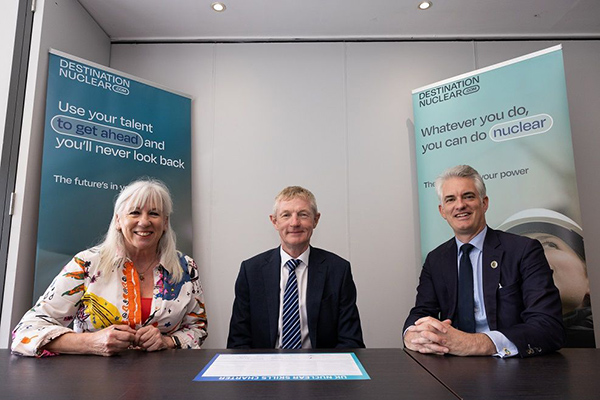A new government-backed strategic skills plan sets out activities to create 40,000 new jobs in the nuclear industry
Launched with a charter signing in Westminster, the National Nuclear Strategic Plan for Skills details how the industry and government can work together to double the number of new apprenticeships by 2026, and double the current hiring rate to fill an estimated 40,000 new jobs by 2030 across the civil and defence nuclear sectors.
The plan was devised by the new Nuclear Skills Taskforce, and is designed to increase the industry’s available workforce by almost 50 per cent and promote the nuclear sector as an attractive, long-term career choice. Its activities will be delivered by the Nuclear Skills Delivery Group.
Beccy Pleasant, NSDG nuclear skills programme director, said: “The skills challenge can be met only if the sector works together to deepen and broaden the skills base. That is why the Skills Plan captures specific themes and projects the industry is now committed to. And this includes finding ways to align skills across the civil and nuclear defence sectors.”
Liz Gregory, director for supply chain and skills at the South Yorkshire-based Nuclear AMRC, said: “We welcome the launch of the Nuclear Skills Charter and look forward to working with our stakeholders to help achieve the ambitious targets set out in the National Nuclear Strategic Plan for Skills.
“We are already working with partners in developing new programmes to assist with the doubling of apprentices and graduates by 2026, the training of the existing workforce, and the 40,000 new entrants required for the nuclear civil and defence sectors by 2030. It is an exciting time to be involved in the nuclear industry and, here at the Nuclear AMRC, we are proud to play our part in realising these ambitious targets.”
Activities in the plan include:
- Doubling apprentice numbers in the nuclear sector by 2025-26, supporting trades including welding, electrical and engineering roles.
- Doubling graduate numbers entering the nuclear workforce in the same period, supported by sponsorship and bursary schemes, while increasing the quantity of PhDs to ensure the highest level of technical skills and knowledge.
- Forming a future leaders scheme to develop tomorrow’s senior personnel.
- Upskilling initiatives for people joining the industry sector mid-career.
- Recruiting talent via a national communications campaign – Destination Nuclear, which launched earlier this year – to outline the wide variety of career opportunities available in the sector.
- Creating regional hubs to increase workforce capacity and capability tailored to local requirements.
- Increasing training capacity for the sector.
- Widening employee diversity and inclusion.



